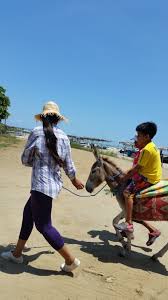The butterfly effect in turning pages
Rut Roman, Ph.D.
Fundacion A mano manaba
Picture a young donkey on the beach, his pannier packed with colorful children's books. As he steps over the rubble and devastation left by a 7.8-magnitude earthquake, his bell calls out to the children left homeless to come and read, and, for a brief moment, forget the desperate situation around them. This was the beginning of what, two years later, is A mano manaba Children's Library. And this attests to the fact that, yes, books can save lives, turning adversity into opportunity.
It all started when my husband and I left our tenured academic positions to live and read with the children of Don Juan, a small fishing village in northern Manabí, Ecuador. Little did we know that a month after this life-changing move, our home, along with every single house in this tiny village, was to be destroyed by a catastrophic earthquake on April 16, 2016, that caused 650 deaths and left 650,000 people homeless in Ecuador. A few days after the quake we discovered that our pet donkey could carry books in his pannier and so we set camp on the beach where all the children of the village would come running to pet him and look at the books. When there was no electricity, running water, schools, or medical services we "played Library" on the beach with colorful books, notebooks, and crayons, sharing happy and constructive afternoons with the children of Don Juan.
Today Fundación A mano manaba is a non-profit organization that offers educational programs in Don Juan. The Children's Library sits within a beautiful bamboo building in the center of the village. It offers remedial reading programs, homework assistance, teacher training, arts and crafts workshops, adult education, and tae kwon-do and self-defense training for girls and women. Our main focus is on young girls. We believe that girls ages 10-12 are the motor of a needed change in local gender dynamics that will diminish the patriarchal domination that burdens women and children in this community.
Life in Don Juan is simple, very affordable, and generally tranquil. Our operating costs for the center are very low and employees (including ourselves) receive the minimum wage in Ecuador, which is sufficient. Along with one of our neighbors who are working hard to finish high school, my husband and I run the Intercultural Center and the Children ́s Library. International and national volunteers support us in areas such as science, technology, or sports. A nominal volunteer fee helps us cover operating costs like electricity, water, and connectivity.
Now that our pet donkey is pasturing on a nearby farm, we are raising funds for a library bus that will take us to more remote villages to replicate the programs that have proved successful in Don Juan. We want to share the lessons, experiences, and basic know-how about providing library services in rural areas. We believe this will be the foundation for a future circuit of children ́s libraries along the pacific coast of Ecuador.
We continue to expand our circle of influence. Once we finish cataloging our books, a lending service will enhance our efforts. Among the results, we expect to obtain with our work is greater community leadership especially among women, and increased rates of school graduation. We also believe our efforts will help to reduce gender-based violence, a pernicious problem especially in rural coastal Ecuador.
In the teacher training and remedial reading programs, we are working with the Universidad Andina Simon Bolivar del Ecuador. Their approach has been tested in Ecuador, Peru, and Bolivia. Using a phonological rather than syllabical method, rapid advances in writing-reading are gained with children from different age groups.
Literacy is a complex asset that speaks of a lettered context. Unfortunately, in developing countries, this usually means urban middle-class surroundings. In addition to children and teenagers, some of our Library patrons finished grade school a long time ago and have had very few opportunities or need to use their literacy skills. Many have lost the ability to read or understand what they read. This underlines the need for a Library system, something that is quite alien to the national government's plans for education in rural locations. The core value of this venture is the grounding of a lettered environment in a community historically neglected by educational services.
The butterfly effect contends that given certain conditions, the distant flapping of a butterfly's wings can alter the course of a tornado. Likewise, the continued page-turning in this small Children ́s Library is broadening life opportunities in a tiny village, turning adversity into possibility, loneliness into community.
.

